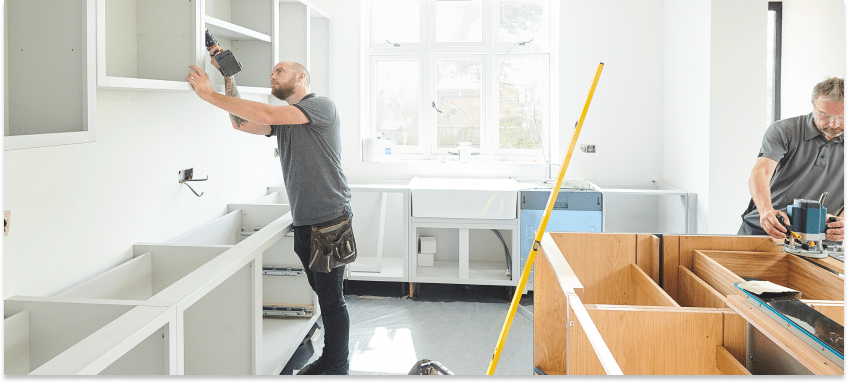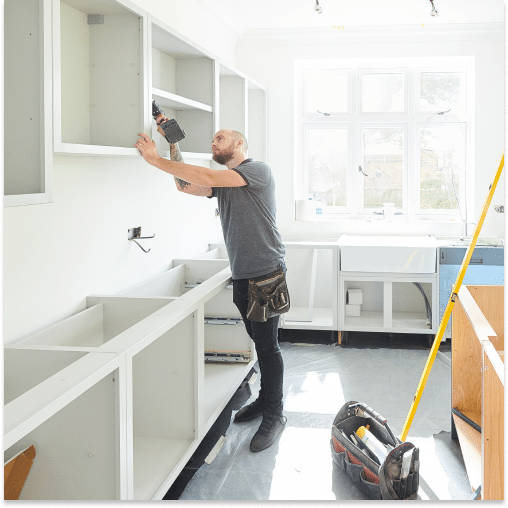Home improvement contractors provide excellent craftsmanship and unbelievable work. However, despite their expertise, contractors are not immune to making mistakes. Therefore, let’s explore the 10 most common mistakes contractors make each and every day.
By understanding these pitfalls, both contractors and homeowners can work together more effectively. This will ensure more successful business operations and better home improvement projects. Overall, it’s important for contractors to prevent these common errors that can greatly affect their business in the long-term.

Recognizing Common Mistakes Contractors Make
Contractors transform houses into the safe living spaces that homeowners envision. Yet, even the most experienced contractors are not immune to the occasional misstep.
Home improvement projects can be complex. Moreover, contractors shoulder the weight of homeowners’ expectations, budgets, timelines, and quality standards.
Here’s why it’s vital for contractors to be well-versed in the most common mistakes they should avoid:
- Professionalism: Recognizing common pitfalls elevates a contractor’s professionalism. Customers are more likely to trust professionals who are aware of potential issues and can provide solutions to avoid them.
- Customer Relationships: Understanding and avoiding common mistakes can help contractors maintain trust, open lines of communication, and foster strong customer relationships. Homeowners appreciate contractors who take their concerns seriously and work diligently to deliver on their promises.
- Project Success: Avoiding common mistakes ultimately leads to project success. This includes accurately estimating project costs, managing schedules effectively, or ensuring the highest quality of work. Addressing these pitfalls can mean the difference between a satisfied customer and a dissatisfied one.
- Legal Protection: Legal obligations are crucial in the construction and home improvement industry. Neglecting legal requirements, such as licensing, permits, and insurance, can lead to costly legal issues.
- Financial Stability: Proper financial management is essential for the long-term success of a contracting business. Understand the financial mistakes that contractors often make, such as underestimating material costs or overcommitting to multiple projects.
- Continuous Improvement: Contractors who take the time to analyze and learn from common mistakes are more likely to achieve continuous improvement. This involves honing skills, adopting better practices, and staying current with industry trends. Contractors who commit to improving are better positioned to thrive in a competitive market.
By understanding these errors and implementing effective solutions, contractors can provide a better service, maintain trust, and establish themselves as leaders within their service area. So, let’s dive into the 10 most common mistakes contractors make in the industry right now.
1. Underselling a Job
Underselling a job is a prevalent error among contractors. It often occurs when contractors underestimate the time, resources, and expenses required for a project.
In fact, this mistake can lead to numerous complications down the line. For example, this includes financial losses, strained customer relationships, and incomplete or subpar work.
To avoid this pitfall, contractors should conduct thorough assessments of each project, considering every detail, and factoring in potential obstacles. A detailed cost estimate, accurate timeline, and a comprehensive understanding of the project’s scope are essential.
Sales software has become the new standard that is helping contractors with price control, product offerings, and materials. For instance, Leap’s SalesPro software ensures that your sales reps aren’t underselling a job or offering products that are no longer available.
2. Scheduling Issues
Scheduling issues can be a major source of frustration for both contractors and homeowners. Delays can occur due to various reasons, including poor planning, unforeseen problems, or inadequate communication.
Contractors should establish realistic timelines that consider potential setbacks. Open and honest communication with customers about delays and unforeseen issues is essential to managing expectations and maintaining trust. Regular updates on project progress can also help in this regard.
Better yet, CRM software can help your team optimize and track their schedules to ensure there’s no overlap. It’s also the best solution to streamlining customer communications! The Leap platform is an end-to-end management solution with scheduling features, workflow automation, and more.
3. Poor Communication with Customers
Effective communication is key to a successful home improvement project. Yet, many contractors falter in this aspect. Miscommunication, lack of responsiveness, or unclear expectations can lead to misunderstandings and dissatisfaction. This is one of the most common mistakes contractors make that affect reputation and referral business.
In general, contractors should prioritize clear and consistent communication with their customers. Regularly updating homeowners on project status, addressing concerns promptly, and ensuring all expectations are well-documented can enhance the overall experience. Furthermore, listening to the customer’s needs and preferences is equally important.
4. Inadequate Documentation
Documentation is often an overlooked aspect of contracting work. However, it’s crucial for a smooth and legally sound project. Failure to maintain proper records can lead to disputes, financial issues, and even legal complications.
This is another area where the best solution is software. Contractors should maintain comprehensive documentation of all project-related activities in one centralized platform. This includes estimates, contracts, change orders, invoices, and any other relevant documents.
A well-documented project provides protection for both the contractor and the homeowner. In addition, it ensures transparency throughout the project.
5. Ignoring Legal Requirements
Neglecting legal requirements is a grave mistake that contractors should avoid at all costs. Licensing, permits, and insurance are essential elements of a contractor’s legal obligations. Overlooking them can lead to serious consequences.
Contractors must ensure they are properly licensed and have the necessary permits for each project. Moreover, carrying adequate insurance coverage is essential for protecting both the contractor and the customer in case of accidents or unexpected issues.
6. Underestimating Material Costs
Material costs often make up a significant portion of a project’s budget. Therefore, underestimating these costs can result in financial strain for contractors and unexpected expenses for homeowners. It’s one of the common mistakes contractors make which can affect their bottom line.
Contractors should conduct thorough research on material prices and trends, including any fluctuations in the market. Building a buffer for potential cost increases is a prudent strategy to ensure that material expenses remain within budget.
7. Neglecting Quality Control
Some contractors may focus too much on completing projects quickly, neglecting the quality of their work. Overall, this can lead to poor craftsmanship and unsatisfied customers.
That’s why it’s important to prioritize quality over speed. Implementing rigorous quality control measures, regular inspections, and using high-quality materials can ensure the final result meets or exceeds expectations.
8. Overcommitting to Multiple Projects
Overcommitting is a common error among contractors who take on too many projects simultaneously. Juggling multiple projects can lead to exhaustion, missed deadlines, and compromised quality. It also plays directly into scheduling issues as mentioned above.
Contractors should realistically assess their capacity and only take on projects they can manage effectively. Prioritizing quality over quantity is often the key to a successful contracting business.
9. Inadequate Financial Management
Financial mismanagement is one of the most common mistakes contractors make. In fact, poor financial practices can lead to cash flow problems that affect a contractor’s ability to complete projects successfully.
Contractors should invest in proper management systems to better track and analyze their financial data. Keeping detailed records of income, expenses, taxes, and other expenses are critical steps to ensuring financial stability.
10. Neglecting Customer Feedback
Contractors who ignore feedback are missing out on a valuable source of information for improvement. Furthermore, failing to address customer concerns and suggestions can harm a contractor’s reputation and future business.
It’s important to actively seek feedback from customers at various stages of the project. Implementing feedback and making improvements enhances the customer’s experience and demonstrates a commitment to continuous improvement.
Perfect Your Processes with Leap
Are you prepared to address these common pitfalls that can make or break your home improvement business? If so, consider the Leap platform for all your management needs.
The Leap platform is a comprehensive software solution that enhances your entire operations. From lead management and sales to workflow automation and project management, Leap takes the operational weight off your shoulders.
Additionally, Leap gives you access to industry-leading partner integrations from some of the most respected names in the industry. It’s the complete platform that is built to meet the demands of every contractor business.
All-in-all, understanding and avoiding the common mistakes contractors make can lead to more successful and satisfying customer experiences. And as the industry evolves, so should your business.
To learn more about Leap, fill out the form below and schedule your very own demo. Discover how you can reshape the way you work to drive your profits forward.
"*" indicates required fields




